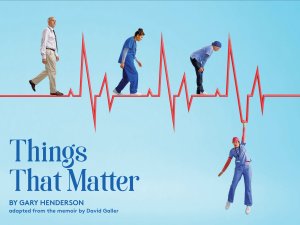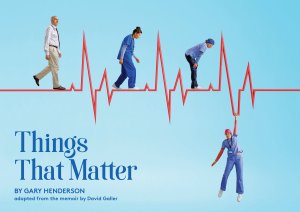Respiratory physician Lutz Beckert considers chronic obstructive pulmonary disease management, including the prevention of COPD, the importance of smoking cessation and pulmonary rehabilitation, and the lifesaving potential of addressing treatable traits. He also discusses the logic of inhaler therapy, moving from single therapy to dual and triple therapy when indicated, as well as other aspects of management
A minefield of metaphor in Dave Galler’s play
A minefield of metaphor in Dave Galler’s play
“How can you know someone with one glance?”
Show: Things That Matter
Adapted by: Gary Henderson
Venue: ASB Waterfront Theatre, Auckland
Season: 11 August to 27 August
When it comes to cards, a wise man once said “you gotta know when to hold ’em, know when to fold ’em,” and this is especially true when you’re holding the Holocaust card.
Any wiggle room for nuance ends once you’ve hurled the unspeakable horror of industrial genocide into the mix.
Which was always going to be the challenge for the Auckland Theatre Company’s adaption of David Galler’s autobiography Things That Matter. Yes, he was an intensive care specialist at Middlemore Hospital for 31 years, and yes, his mother suffered at Auschwitz. So, I guess, drawing metaphorical connections was impossible to resist.
First things first, Things That Matter lays out the impossibility of providing care in a system that is underfunded, understaffed and overwhelmed, while connecting poverty and uncaring fast-food corporations to chronic health conditions.
Rafal Beckman, the lead character and narrator (Ian Hughs), is head of the intensive care unit and principal advisor to the health minister (a role Dr Galler himself once held).
The minister (David Aston) is played as a cliché, but his disinterest gives our doctor the chance to straight talk the social determinants of health and the human and economic benefits of addressing them.
FWIW, in this world, primary care doesn’t get a mention. Soz.
The staging is excellent and imaginative, with long plastic tubes hanging like oversized IV lines, which serve as transparent walls and allow the audience to see into the treatment rooms. Later, with the addition of overhead lights, the tubes become candles.
Critically ill patients and whānau begin arriving and we are drawn into their stories as practitioners juggle providing effective treatment with the constant flow at the door.
The wider point becomes about dehumanisation, especially within a strained healthcare system. At one point a nurse berates a doctor for talking about “them” in relation to people with diabetes.
“I know who ‘they’ are,” she says, “they’re my mum, my sisters, my cousins; they are me…”
Then there are the budget cuts, first the tearoom goes, then the cookie jar, then Dr Beckman’s lifeline, the hospital swimming pool, but not before black mould is found in the walls.
At the same time, his personal story is unveiling – often with humour – and we learn of his feelings of failure over the death of his father, and his mother, Roza’s, terminal cancer.
The dry ice drifting over the set at the start hadn’t made a lot of sense until we hear Roza (Donogh Rees) talk of arriving at Auschwitz to be judged by Josef Mengele. She is chosen to live, her mother isn’t, and she remembers looking at the smoke coming from the ovens wondering which cloud was her mother.
Mengele then becomes a parallel for seeing people as a statistic: “One glance, that was all,” says Roza. “How can you know someone with one glance?”
Okay, it was heavy. But it was okay.
Then the second half begins with images being projected onto louvered blinds. First, the infamous Auschwitz gates, then the frontage of Middlemore Hospital, then back to the death camp, then back to…well, you get the idea.
Margie Apa was in attendance, and before becoming chief executive at Te Whatu Ora she held the same role at Counties Manukau, and had been based at Middlemore. I would dearly love to know what she thought of the parallel being drawn.
For mine, it was outrageous.
The performance continues, fates are decided, and then, at the end, much of the crowd stands to applaud.
You can’t argue with the medical and social messaging, and I really hope people will leave the play with a better understanding of just how much needs to be done in healthcare, and society for that matter.
You also can’t argue with the reality of David Galler’s career and the restrained anger of his story; above and beyond.
But I’ve said enough, I think I’ll fold now.
Judge for yourself, tickets are available at www.atc.co.nz
We're publishing this article as a FREE READ so it is FREE to read and EASY to share more widely. Please support us and our journalism – subscribe here
One of the benefits of subscribing is you will also be able to share your thoughts about what you read with other in our Comment Stream. You can also take notes on what you read with Capture







![Barbara Fountain, editor of New Zealand Doctor Rata Aotearoa, and Paul Hutchison, GP and senior medical clinician at Tāmaki Health [Image: Simon Maude]](/sites/default/files/styles/thumbnail_cropped_100/public/2025-03/Barbara%20Fountain%2C%20editor%20of%20New%20Zealand%20Doctor%20Rata%20Aotearoa%2C%20and%20Paul%20Hutchison%2C%20GP%20and%20senior%20medical%20clinician%20at%20T%C4%81maki%20Health%20CR%20Simon%20Maude.jpg?itok=-HbQ1EYA)
![Lori Peters, NP and advanced health improvement practitioner at Mahitahi Hauora, and Jasper Nacilla, NP at The Terrace Medical Centre in Wellington [Image: Simon Maude]](/sites/default/files/styles/thumbnail_cropped_100/public/2025-03/2.%20Lori%20Peters%2C%20NP%20and%20advanced%20HIP%20at%20Mahitahi%20Hauora%2C%20and%20Jasper%20Nacilla%2C%20NP%20at%20The%20Terrace%20Medical%20Centre%20in%20Wellington%20CR%20Simon%20Maude.jpg?itok=sUfbsSF1)
![Ministry of Social Development health and disability coordinator Liz Williams, regional health advisors Mary Mojel and Larah Takarangi, and health and disability coordinators Rebecca Staunton and Myint Than Htut [Image: Simon Maude]](/sites/default/files/styles/thumbnail_cropped_100/public/2025-03/3.%20Ministry%20of%20Social%20Development%27s%20Liz%20Williams%2C%20Mary%20Mojel%2C%20Larah%20Takarangi%2C%20Rebecca%20Staunton%20and%20Myint%20Than%20Htut%20CR%20Simon%20Maude.jpg?itok=9ceOujzC)
![Locum GP Helen Fisher, with Te Kuiti Medical Centre NP Bridget Woodney [Image: Simon Maude]](/sites/default/files/styles/thumbnail_cropped_100/public/2025-03/4.%20Locum%20GP%20Helen%20Fisher%2C%20with%20Te%20Kuiti%20Medical%20Centre%20NP%20Bridget%20Woodney%20CR%20Simon%20Maude.jpg?itok=TJeODetm)
![Ruby Faulkner, GPEP2, with David Small, GPEP3 from The Doctors Greenmeadows in Napier [Image: Simon Maude]](/sites/default/files/styles/thumbnail_cropped_100/public/2025-03/5.%20Ruby%20Faulkner%2C%20GPEP2%2C%20with%20David%20Small%2C%20GPEP3%20from%20The%20Doctors%20Greenmeadows%20in%20Napier%20CR%20Simon%20Maude.jpg?itok=B0u4wsIs)
![Rochelle Langton and Libby Thomas, marketing advisors at the Medical Protection Society [Image: Simon Maude]](/sites/default/files/styles/thumbnail_cropped_100/public/2025-03/6.%20Rochelle%20Langton%20and%20Libby%20Thomas%2C%20marketing%20advisors%20at%20the%20Medical%20Protection%20Society%20CR%20Simon%20Maude.jpg?itok=r52_Cf74)
![Specialist GP Lucy Gibberd, medical advisor at MPS, and Zara Bolam, urgent-care specialist at The Nest Health Centre in Inglewood [Image: Simon Maude]](/sites/default/files/styles/thumbnail_cropped_100/public/2025-03/7.%20Specialist%20GP%20Lucy%20Gibberd%2C%20medical%20advisor%20at%20MPS%2C%20and%20Zara%20Bolam%2C%20urgent-care%20specialist%20at%20The%20Nest%20Health%20Centre%20in%20Inglewood%20CR%20Simon%20Maude.jpg?itok=z8eVoBU3)
![Olivia Blackmore and Trudee Sharp, NPs at Gore Health Centre, and Gaylene Hastie, NP at Queenstown Medical Centre [Image: Simon Maude]](/sites/default/files/styles/thumbnail_cropped_100/public/2025-03/8.%20Olivia%20Blackmore%20and%20Trudee%20Sharp%2C%20NPs%20at%20Gore%20Health%20Centre%2C%20and%20Gaylene%20Hastie%2C%20NP%20at%20Queenstown%20Medical%20Centre%20CR%20Simon%20Maude.jpg?itok=Z6u9d0XH)
![Mary Toloa, specialist GP at Porirua and Union Community Health Service in Wellington, Mara Coler, clinical pharmacist at Tū Ora Compass Health, and Bhavna Mistry, specialist GP at Porirua and Union Community Health Service [Image: Simon Maude]](/sites/default/files/styles/thumbnail_cropped_100/public/2025-03/9.%20Mary%20Toloa%2C%20Porirua%20and%20Union%20Community%20Health%20Service%20in%20Wellington%2C%20Mara%20Coler%2C%20T%C5%AB%20Ora%20Compass%20Health%2C%20and%20Bhavna%20Mistry%2C%20PUCHS%20CR%20Simon%20Maude.jpg?itok=kpChr0cc)